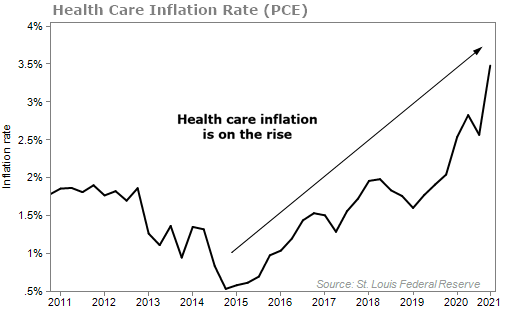I don't like making predictions...
When I hear some "expert" claiming to know exactly what's going to happen in the economy or the stock market, I mostly ignore it.
But there's one prediction I'm completely comfortable making...
You're in for much more medical testing before you die.
You may be healthy today... and hopefully for a long time in the future. But as you grow older and medical technology expands, you're going to get more pricks, scans, and labs.
According to a study from health-policy nonprofit Kaiser Family Foundation, Medicare spends an average of $5,562 annually for 66-year-old enrollees. By age 80, annual costs more than double to $11,618. In fact, folks over 80 account for about a third of all Medicare spending.
America is aging fast. In 2010, 40 million folks in the U.S. were over the age of 65 (only 13% of the population). By 2030, we'll have 72 million at that age (19% of the population).
You'll also get more tests because medical science will develop more tests...
My father was an ophthalmologist. When he started practicing, he relied on a magnifying glass. By the time I was in medical school, we could analyze a patient's DNA and run dozens of other tests to get a diagnosis. (In fact, I discovered one condition caused by a single-point gene mutation in the clear part of the eye – the cornea – now called polymorphic corneal amyloidosis.)
That all means more people getting more medical treatment.
But the problem is, health care isn't getting more affordable.
Health care costs have grown at a rate that far outpaces general inflation. And unfortunately, the rate of inflation in health care has been growing for the past several years...

And retirees can't afford it. According to a 2019 report from the U.S. Federal Reserve, 17% of Americans aged 45 to 59 and 13% of folks over 60 have zero retirement savings.
Those numbers terrify me.
And it's one of the main drivers behind a retirement crisis no one is talking about.
You see, little by little... in all sorts of clever, stealthy ways... the U.S. government and Wall Street have made it harder and harder for you to enjoy the retirement you've always imagined.
As a result, today's American retiree is now paddling upstream against:
- Soaring taxes (rumored to get even higher)
- Crippling adviser and portfolio fees
- Skyrocketing medical bills
- Historic inflation numbers and food prices
- An overvalued stock market
- A left-for-dead bond market
In other words, you – the American retiree or future retiree – are now facing a crisis like never before in history.
And next week, I'm doing something about it.
I'm hosting a first-of-its-kind event where I'll reveal the No. 1 lie being told to American retirees... and a shocking tweak you can make to the way you're managing your money, which could have a massive impact on your wealth.
I believe this event will be the magnum opus of my entire career. It's the result of years working in finance, medicine, and financial research.
Now let's dig into this week's Q&A... As always, please send your questions, comments, suggestions, and criticisms to [email protected]. We read every e-mail.
Q: For grilling – does it make a difference between charcoal or propane fuel source? – J.M.
A: When you're grilling, gas is the way to go. The Food Standards Agency in London tested different types of grilling. Of all their extensive tests, meat cooked in the charcoal and woodchip barbecues had the highest concentration of polycyclic aromatic hydrocarbons (PAHs) – known carcinogens. Gas grills cook at a lower and more even temperature than charcoal. They also produce less smoke. So you're getting fewer PAHs.
Q: I heard recently that people over 75 (I'll be 76 in early August) no longer need to have colonoscopies. Is this true?
Thank you in advance for your answer. – A.V.
A: Screening for colorectal cancer is one of the few essential medical tests.
The U.S. Preventive Services Task Force (USPSTF) is a panel of 16 MDs and PhDs whose specialties range from behavioral health to pediatrics. These experts look at research and make recommendations on the usefulness of screenings, counseling services, and preventative medications. They write guidelines that any doctor worth his salt will follow.
Last month, the USPSTF updated its colorectal-cancer screening guidelines. It recommends screening for adults aged 45 to 75 years old. And for folks like you, aged 76 to 85, the USPSTF recommends screening adults who have never been screened, have a long life expectancy, or have a family history of colorectal cancer. But it largely depends on individual circumstances. From ages 86 and on, evidence shows there's no benefit to screening.
Types of screening include fecal occult blood testing, sigmoidoscopies, and colonoscopies.
I always advise readers to do their own research and take a close look at the risks and benefits before undergoing any medical procedure or treatment.
You can read more from us here. And we also have tips to keep your colon healthy here.
What We're Reading...
- Did you miss it? Don't let your dream retirement become a nightmare.
- Something different: The Girl Scouts have millions of boxes of cookies left over.
Here's to our health, wealth, and a great retirement,
Dr. David Eifrig and the Health & Wealth Bulletin Research Team
June 18, 2021
